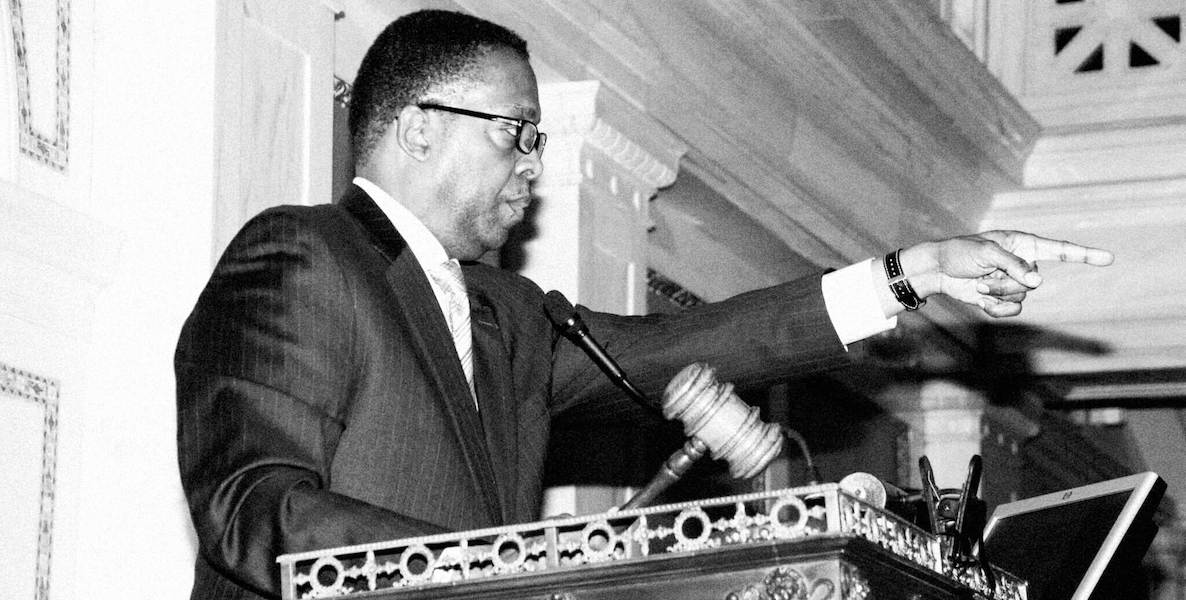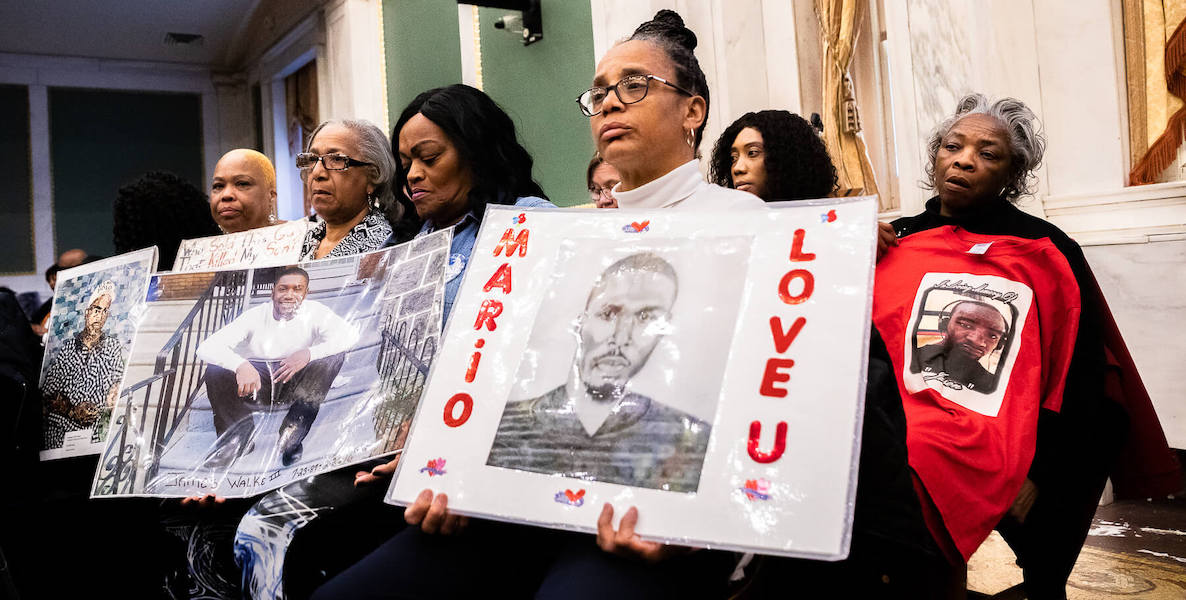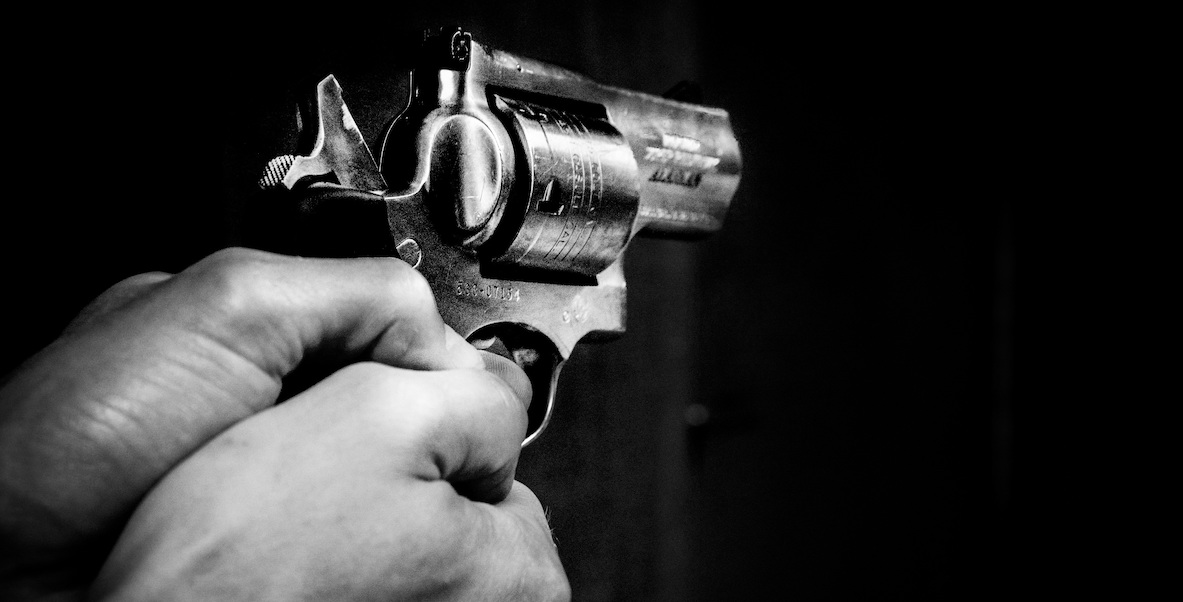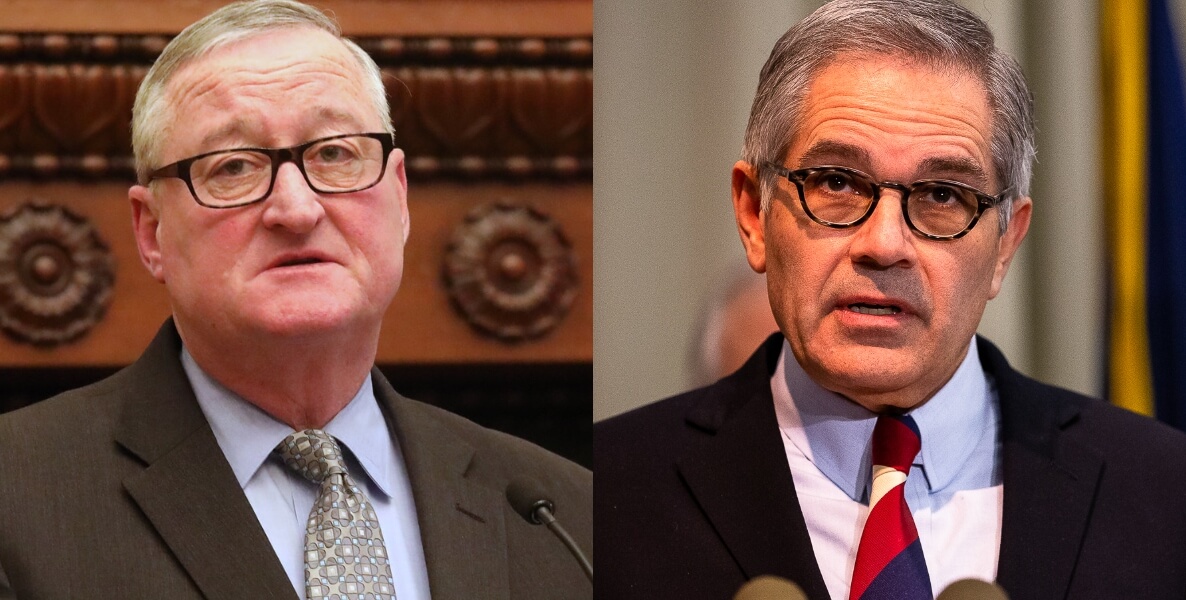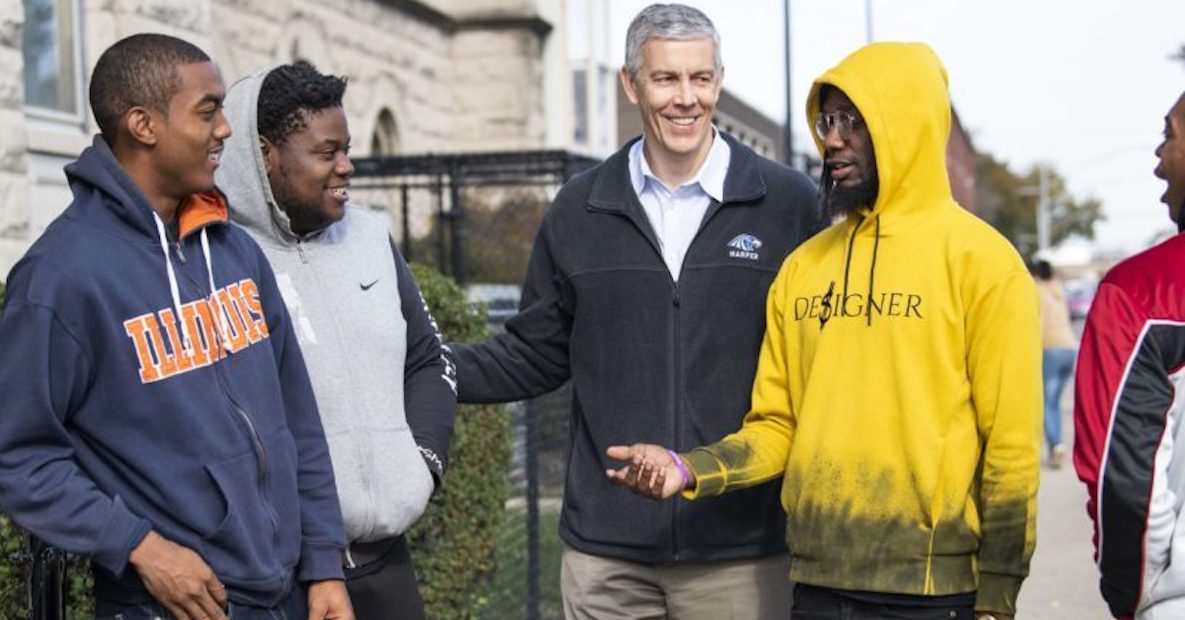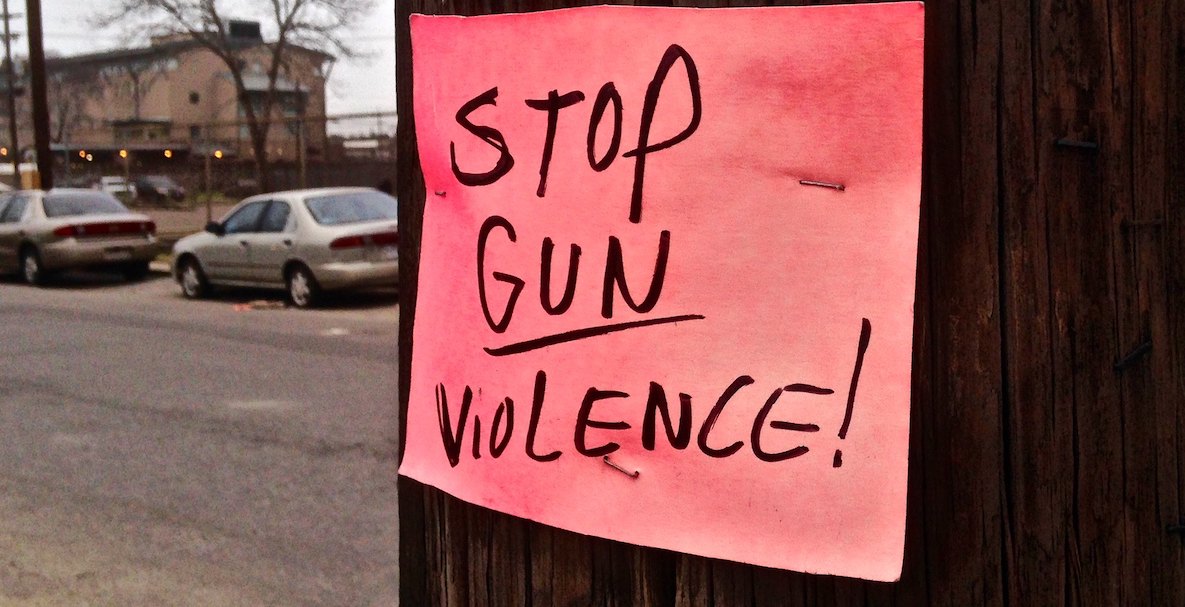![]() In 2015, when Arne Duncan moved back to Chicago after serving as President Obama’s education secretary, he set out on a listening tour of perhaps the least listened-to young men in America: Shooters.
In 2015, when Arne Duncan moved back to Chicago after serving as President Obama’s education secretary, he set out on a listening tour of perhaps the least listened-to young men in America: Shooters.
Duncan went to the Cook County Jail and to the streets in the Chicago neighborhoods where most of the gun violence takes place, and he asked the same question over and over to dozens of young, mostly African-American, men: How much money would it take for you to put down the guns?
At first, he didn’t believe the answer because it seemed to contradict everything he had heard about the illicit dealings on street corners that often led to violence. For a legal job paying just $12 or $13 an hour—less than Chicago’s $14/hour minimum wage—the men said they would put down their guns and turn away from the life they’d been leading.
“Everyone has a price point for changing their behavior, but people don’t believe me when I tell them what I learned from these conversations,” Duncan says. “It’s a myth that everyone’s getting rich on the streets. There are so many guys out there that there’s no economies of scale for selling. They’re getting shot, chased by the police. They’re not winning.”
![]() Four years ago—at the height of Chicago’s gun violence epidemic—Duncan used what he learned to launch CRED, Create Real Economic Destiny, which works primarily in one of the 15 Chicago neighborhoods responsible for 80 percent of the city’s gun violence. The program recruits participants through street outreach, which also works to interrupt violence in real time; pays them to attend counseling, high school classes and job training for nine to 18 months; then helps place them in jobs at one of 40 different Chicago companies.
Four years ago—at the height of Chicago’s gun violence epidemic—Duncan used what he learned to launch CRED, Create Real Economic Destiny, which works primarily in one of the 15 Chicago neighborhoods responsible for 80 percent of the city’s gun violence. The program recruits participants through street outreach, which also works to interrupt violence in real time; pays them to attend counseling, high school classes and job training for nine to 18 months; then helps place them in jobs at one of 40 different Chicago companies.
Shootings skyrocket—except in CRED’s neighborhood
As in Philadelphia, New York City and many other cities in America, this year in Chicago has been a bloodbath. After three consecutive years of double digit drops in gun violence, shootings in the city are up 51 percent; more than 3,200 people have been shot, putting Chicago on track to erase all the progress it made, and to become the most violent city in a violent America.
But in the far South Side neighborhood of Roseland where CRED has operated for the last four years, shootings in 2020 have dropped 33 percent. “That gives me a lot of hope and confidence that if we can scale and expand to other communities it can really have an impact,” Duncan says.
CRED, a nonprofit almost entirely funded by philanthropy—in particular Laurene Powell Jobs’s Emerson Collective, where Duncan is a Managing Partner—uses some of the same proven methods for gun violence reduction as programs like CeaseFire, which in Oakland reduced shootings by 50 percent over seven years:
It uses data to track where shootings happen, and who are the most likely victims and perpetrators. (The first year, working with researchers at the University of Chicago, CRED identified 275 men at that time who were most likely to be shooters or victims; they’ve now worked with 310.) On behalf of the Mayor’s Office, it convenes police, community groups and various city departments that work in Chicago’s south and west sides to coordinate efforts. And it uses the power of relationships to create change in people’s lives, through violence interrupters and other community outreach workers.
Those same elements were part of two Philadelphia pilots launched in 2013 that also showed success in cutting gun violence: One, Focussed Deterrence in South Philadelphia led to 35 percent fewer shootings in two police districts over two years; the other, Cure Violence, saw a 30 percent reduction in neighborhoods around Temple University Hospital.
Those efforts came to an end, though, when Mayor Jim Kenney took office in 2016 and neither extended nor expanded them. Meanwhile, under the leadership of Kenney, District Attorney Larry Krasner and now Police Commissioner Danielle Outlaw, shootings in Philly have continued to rise. This year, more than 355 people have been killed—a 38 percent increase over the same time period in 2019.
But what’s unique about CRED is in its name, which Duncan says came from the earliest participants themselves: Economic Destiny.
“We’re not trying to solve a crime problem; we’re trying to solve an economic problem,” Duncan says. “These are men, not boys. They’re going to eat, put a roof over their heads, feed their children. They can either do it through the street economy or a legal economy.”
How CRED works
The program has five pillars:
- Street Outreach: 39 men with credibility on the street, who Duncan refers to as the “HR team,” not only recruit participants for the program, but also help to interrupt the violence. In the last four years, Duncan says, those workers have negotiated five non-aggression agreements among warring cliques, two peace treaties and hundreds of individual disputes. CRED entices participants with a stipend that increases the more they engage with the program, over the course of nine to 18 months.
- Life Coaching: Each participant is assigned to one of 10 coaches, who works one on one to help them deal with immediate needs, and then look ahead to a different future.
 Clinical therapy: 10 clinicians help participants work through trauma, anger, grief, depression. “It’s not post-traumatic stress,” Duncan said last month in a talk to the City Club of Chicago. “It’s current and present, and it’s been since a lot of these guys are born.” To wit: Duncan recalls a man who said he grew up in a house full of guns. “I grew up in a house of books; my sister and brother and I all became educators,” Duncan said. “He became a shooter.”
Clinical therapy: 10 clinicians help participants work through trauma, anger, grief, depression. “It’s not post-traumatic stress,” Duncan said last month in a talk to the City Club of Chicago. “It’s current and present, and it’s been since a lot of these guys are born.” To wit: Duncan recalls a man who said he grew up in a house full of guns. “I grew up in a house of books; my sister and brother and I all became educators,” Duncan said. “He became a shooter.”- Education: CRED’s three teachers have helped more than 100 men get their high school diplomas.
- Employment and Training: Through CRED, participants can get training and certifications in the hospitality, culinary and manufacturing industries among other well-paying careers. (Two alumni work at law firms, Duncan says, and one works at Deloitte Consulting; a couple others are now in college.) Duncan has amassed a cadre of 40 local companies, mostly through personal connections, willing to consider hiring CRED graduates—something he admits is “out of their comfort zone,” but that he insists is not charity.
“We’re not asking anyone to hire guys straight out of Cook County Jail,” Duncan says. “We’re asking them after they’ve done the time with us. Do they want people who are resilient, leaders, committed to change and being positive role models? We have an amazing pool of talent.”
Duncan’s work with CRED stems from a lifetime of witnessing tragedy that guns have wrought in his hometown. He grew up playing basketball in Chicago playgrounds, with young men who he says “protected” him—but many of whom were killed by gunfire on their same shared streets when Duncan was still a teenager. “That shapes you and scars you in some ways that are difficult to talk about or even acknowledge,” he says.
As superintendent of Chicago schools for over seven years, Duncan faced all the myriad challenges of a big city schools chief. But none was harder than meeting for the first time the families of young people killed, on average, one every two weeks—often at their heart wrenching funerals.
 “I know we as adults failed to keep kids safe,” Duncan says. “Kids on the South and West Sides here live with a level of fear and trauma that is extraordinary. One hundred percent of them know someone who’s been killed; often they know five, 10, 15. I go to schools and want to talk about college, about deferred gratification, but we have to deal with the trauma.”
“I know we as adults failed to keep kids safe,” Duncan says. “Kids on the South and West Sides here live with a level of fear and trauma that is extraordinary. One hundred percent of them know someone who’s been killed; often they know five, 10, 15. I go to schools and want to talk about college, about deferred gratification, but we have to deal with the trauma.”
When he left Chicago in 2009, Duncan says he thought things couldn’t get worse; then they did, with 769 murders in 2016. “This is beyond unfinished business,” he says. “Chicago has given me everything. For me to come home and not work on this just didn’t feel right.”
With CRED, Duncan started from the understanding that young Black men in Chicago often start out with few opportunities for a long and prosperous life. As the organization puts it: CRED is not a “second chance”—it’s a first chance for many.
What Duncan said to the City Club a couple weeks ago in Chicago applies here, as well: “We have to do better as a city. We owe it to our city, our citizens, ourselves.”
In Philly, that fact is no different, and the solution—economic empowerment—no less a powerful idea. Colwin Williams, one of a handful of street supervisors and violence interrupters still working with Cure Violence in North Philly, hears the same thing every time he walks through a neighborhood as Duncan did from the young men in Chicago.
“We hear about jobs every time we come out,” he says. “They all ask me the same thing: Do you got a job for me? Where are the opportunities?”
Williams’ answer is to try to find work for the young men where he can—but it is never enough.
CRED spends about $10 million a year for its work in Roseland, very little of which comes from public funding. Last month, Duncan and the leaders of two other community-based groups urged public officials to do more, by adding another $50 million in city funding to programs that have been effective.
“Violence prevention is barely a rounding error in our public safety budgets. It’s long past time to begin shifting resources from over-policing, prosecutions and prisons and give many more young people a real chance in life through these kinds of programs. Chicago can lead the nation if we start to think and act differently,” Duncan said at a press conference.
Policing alone is not the answer
![]() Like in Philadelphia, policing alone has not worked: Despite a $1.76 billion policing budget, and a police force bigger than both New York’s and Los Angeles’s, fewer than 50 percent of Chicago homicide investigations result in arrests—the same as in Philly. Meanwhile, according to a report by Boston Consulting Group, shootings cost the city $3.5 billion a year in medical, prosecution and incarceration costs.
Like in Philadelphia, policing alone has not worked: Despite a $1.76 billion policing budget, and a police force bigger than both New York’s and Los Angeles’s, fewer than 50 percent of Chicago homicide investigations result in arrests—the same as in Philly. Meanwhile, according to a report by Boston Consulting Group, shootings cost the city $3.5 billion a year in medical, prosecution and incarceration costs.
By that measure, the $50 million ask for proven violence reduction strategies seems a mere trifle. To bring CRED to all 14 of Chicago’s most violent neighborhoods would cost $150 to $200 million a year, an amount Duncan says could be found by reducing Chicago Police Department staff by about 1,000 officers; in late September, the department had 846 vacancies.
But doing that takes something even harder to come by than money: Political will.
That is something else Philly and Chicago have in common. Despite years of increasing gun violence, there is still no coordinated effort even among city departments—not to mention nonprofits and the private sector—to deploy a proven solution for reducing shootings. Commissioner Outlaw’s plan for revamping her department includes Focussed Deterrence, which Kenney has said he supports, as well. But there is no timeline for getting it off the ground, nor public buy-in from Krasner, nor funding set aside for most of her ideas.
Instead, Philly has an Office of Violence Prevention that has spent more than $1 million in the last year with little to show for it. As chronicled last month by Inquirer columnist Helen Ubiñas, the office pays its staff, including executive director Rondell Revell, more than $420,000.
It gave out another $700,000 to community-based organizations, which Mayor Kenney’s senior director of Violence Prevention Strategies and Programs Theron Pride told me last year was intended to empower communities to take back their streets—though they were not expected to lower violence necessarily.
A spokesperson for the office told Ubiñas it has not been able to study the effectiveness of the programs because of pandemic-related budget cuts. But the result is pretty obvious: They’re not working.
Which begs the obvious question: Couldn’t that $1 million-plus be used to implement an already proven violence reduction strategy, like CeaseFire or CRED?
What Duncan said to the City Club a couple weeks ago in Chicago applies here, as well: “We have to do better as a city. We owe it to our city, our citizens, ourselves.”
The Citizen is one of 20 news organizations producing Broke in Philly, a collaborative reporting project on solutions to poverty and the city’s push towards economic justice. Follow the project on Twitter @BrokeInPhilly.
Arne Duncan, middle, with some CRED participants in Chicago. Photo: CRED.


